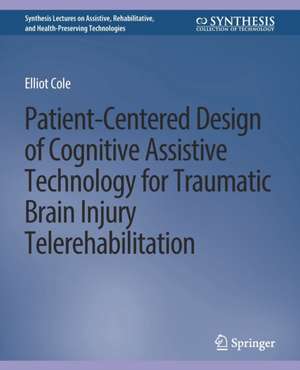Patient-Centered Design of Cognitive Assistive Technology for Traumatic Brain Injury Telerehabilitation: Synthesis Lectures on Technology and Health
Autor Elliot Coleen Limba Engleză Paperback – 23 mar 2013
Din seria Synthesis Lectures on Technology and Health
-
 Preț: 392.60 lei
Preț: 392.60 lei -
 Preț: 318.07 lei
Preț: 318.07 lei - 20%
 Preț: 296.34 lei
Preț: 296.34 lei - 20%
 Preț: 419.25 lei
Preț: 419.25 lei - 20%
 Preț: 223.34 lei
Preț: 223.34 lei - 20%
 Preț: 331.08 lei
Preț: 331.08 lei - 20%
 Preț: 300.66 lei
Preț: 300.66 lei - 20%
 Preț: 326.13 lei
Preț: 326.13 lei - 20%
 Preț: 390.32 lei
Preț: 390.32 lei - 20%
 Preț: 326.97 lei
Preț: 326.97 lei - 20%
 Preț: 358.04 lei
Preț: 358.04 lei - 20%
 Preț: 328.60 lei
Preț: 328.60 lei - 20%
 Preț: 329.76 lei
Preț: 329.76 lei - 20%
 Preț: 298.64 lei
Preț: 298.64 lei - 20%
 Preț: 228.80 lei
Preț: 228.80 lei - 20%
 Preț: 269.03 lei
Preț: 269.03 lei - 20%
 Preț: 270.04 lei
Preț: 270.04 lei - 20%
 Preț: 329.26 lei
Preț: 329.26 lei - 20%
 Preț: 246.51 lei
Preț: 246.51 lei
Preț: 226.64 lei
Preț vechi: 283.30 lei
-20% Nou
Puncte Express: 340
Preț estimativ în valută:
43.37€ • 45.28$ • 35.89£
43.37€ • 45.28$ • 35.89£
Carte tipărită la comandă
Livrare economică 05-19 aprilie
Preluare comenzi: 021 569.72.76
Specificații
ISBN-13: 9783031004667
ISBN-10: 3031004663
Ilustrații: XX, 139 p.
Dimensiuni: 191 x 235 mm
Greutate: 0.29 kg
Editura: Springer International Publishing
Colecția Springer
Seriile Synthesis Lectures on Technology and Health, Synthesis Lectures on Assistive, Rehabilitative, and Health-Preserving Technologies
Locul publicării:Cham, Switzerland
ISBN-10: 3031004663
Ilustrații: XX, 139 p.
Dimensiuni: 191 x 235 mm
Greutate: 0.29 kg
Editura: Springer International Publishing
Colecția Springer
Seriile Synthesis Lectures on Technology and Health, Synthesis Lectures on Assistive, Rehabilitative, and Health-Preserving Technologies
Locul publicării:Cham, Switzerland
Cuprins
Introduction.- Some Clinical Features of the Cognitive Disabilities Domain with TBI Examples.- Adapting Computer Software to Address Cognitive Disabilities.- The Primacy of the User Interface.- Patient-Centered Design.- Cognitive Prosthetics Telerehabilitation.- The Active User and the Engaged User.- Patient Case Studies in the Use of Cognitive Assistive Technology: Successes and Failures.- Conclusions, Factors Influencing Outcomes, Anomalies, and Opportunities.- Bibliography.
Notă biografică
Dr. Elliot Cole is the founder of the Institute for Cognitive Prosthetics. He brings his training in human-centered computing to developing technology and techniques that address cognitive disabilities from brain injury. The Institutes successful R&D efforts came from a multidisciplinary staff from clinical and computing specialties working closely together and focusing on the rehabilitation needs of the individual patient. This approach has generated deep knowledge of the cognitive disabilities computing domain. For over a decade, the Institute had a ""lab"" brain injury cognitive rehabilitation facility. Dr. Cole was an associate professor at Drexel University and a research associate at the University of Pennsylvania, where he is currently a Visiting Scholar.
